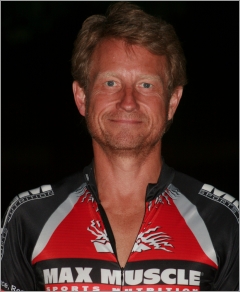 | ||
| ||||||||
By Mike DeZellar
Phil Moen, post-stroke Phil Moen had his personal best at last year’s Northshore Inline Marathon. Moen, then 48 years old, completed the race in 1:13:18, finishing 13th in the competitive elite veteran category and 31st overall. For many skaters, Northshore marks the end of the competitive season. But Phil kept training with an eye on the next season. Then, after a 16-mile training skate on October 17, 2009, everything changed. After his skate that day, Phil stopped at the local Home Depot. He suddenly felt uneasy. The ground beneath him moved, his body listed to the left and he struggled to keep his balance. Growing increasingly uncomfortable, he grabbed a shopping cart to assist him back to his car where he was able to call his wife, Shelly. When Shelly and their oldest son Cooper (who holds the NSIM record for 12 year olds, now 17) arrived, it had been about 25 minutes since he first felt “different”. The worst of it hit 45 minutes later at home with a minute and a half of extreme vertigo causing him to lie on his back on the kitchen floor. Fearful to stand, and feeling uneasy, he retreated to the couch to rest. He fell asleep. It had now been about 90 minutes since his first episode at the Home Depot. The uneasy feeling continued and Shelly convinced him to seek medical attention. The emergency room saw him quickly and conducted several tests. There must be a simple explanation, Phil thought. When the physician entered his room 6 ½ hours after his first symptoms, he was shocked by the unexpected phrase, “You’ve had a stroke.” According to the American Stroke Association, stroke is the No. 3 cause of death in the United States, behind diseases of the heart and cancer. About 795,000 Americans each year suffer a new or recurrent stroke. That means, on average, a stroke occurs every 40 seconds and kills more than 137,000 people a year. That's about 1 of every 18 deaths. On average, every 4 minutes someone dies of stroke. Phil spent the next three days in the hospital and, given his conditioning and good health, his case was taken by the Head of Neurology at the Mayo Clinic. For the next two months, Phil was taken through all known stroke investigative sciences. Still today, he is cryptogenic – there is no known cause for the stroke he endured. Phil was very lucky; he has no lasting physical or mental deficiencies. Since his life-changing event, he has pledged a part of his life to stroke awareness and prevention. As a result, last winter Phil created a new inline speed team along with sports nutrition company, Max Muscle. The team is in part dedicated to stroke awareness and prevention. Among its skaters are pros and recreational skaters aged 11 to 68. When asked about his ordeal, Phil reflects, “Of course the best way to avoid stroke is to be healthy, control your blood pressure and don’t smoke. But, stroke can happen to the healthiest of us too, so it is equally important to be able to recognize a stroke. The people around me didn’t and I didn’t. That put me at great risk. Hopefully, others can learn from my experience.” That’s why he is promoting stroke awareness. According to the American Stroke Association it is important to understand and recognize the warning signs of stroke:
It is equally important to take quick action and seek medical attention should you experience any of these symptoms. Immediately call 9-1-1 or the emergency medical services (EMS) number so an ambulance (ideally with advanced life support) can be sent for you. Also, check the time so you'll know when the first symptoms appeared. If given within 3 hours of the start of symptoms, a clot-busting drug called tissue plasminogen activator (tPA) may reduce long-term disability for the most common type of stroke. tPA is the only FDA-approved medication for the treatment of stroke within three hours of stroke symptom onset.
Understanding the risks and warning signs of stroke, combined with immediate action, could help save you or someone you love. Phil was lucky even though his reaction was poor. He completely recovered from his stroke and returned to racing where he finished 8th in the Open Pro Division of the 2010 Metrodome Inline Marathon in March. He also distributed Stroke Awareness information in the race packets for the 1st Annual Apostle Island Inline Marathon in June. Phil and his Max Muscle Team, now 23 members strong, are passionate about stroke prevention and will be in Duluth for this week’s 15th Northshore Inline Marathon. Please stop and say hello to a “Musclehead,” but don’t be surprised if the conversation turns to stroke awareness. --- Mike DeZellar skated his first Northshore Inline Marathon in 1999 at the urging of former race director, George Hovland, and has been competing ever since. His race highlights include a 5th place Pro Veteran finish in the 2009 Chicagoland Inline Tour, 7th Overall at the 2010 Apostle Island Inline Marathon, 17th Overall at the 2010 Chicago Inline Marathon, and 4th overall at the 2010 North of the 49th Inline Marathon in Winnipeg, MB. Currently, Mike is a member of the Max Muscle Inline Speed Team.
Related reading: • Skate Tip of the Week Archive
...
Copyright © 2010 Inline Planet | ||||||||


